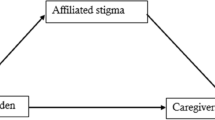Abstract
The present study aimed to study the effects of affiliate stigma among family caregivers of psychiatric patients. Total sample of 203 male and female caregivers of psychiatric patients were approached and administered the scales. The demographics and the item scores of the Affiliate Stigma Scale were analyzed using descriptive statistical analyses such as mean, standard deviation, and frequency. Moreover, t test was applied to explain group differences among demographics and affiliate stigma and its components. Results showed considerable differences between gender, marital status and employments status on affiliate stigma and its components with married, unemployed females experiencing more affiliate stigma while providing care for a family member with psychiatric illness.
Similar content being viewed by others
References
Afridi, M.A.: Mental health problems in Pakistani society as a consequence of violence and trauma: a case for better integration of care. Pak. J. Psychol. 40(1), 3–15 (2009). Retrieved from http://www.ncbi.nlm.nih.gov/pmc/articles/PMC3225239/
Ali, A., Hassiotis, A., Strydom, A., King, M.: Self stigma in people with intellectual disabilities and courtesy stigma in family carers: a systematic review. Res. Dev. Disabil. 33, 2122–2140 (2012)
Black, K.: Business Statistics: Contemporary Decision Making, 6th edn. Wiley, New Jersey (2010)
Chiu, M.Y.L., Yang, X., Wong, F.H.T., Li, J.H., Li, J.: Caregiving of children with intellectual disabilities in China–an examination of affiliate stigma and the cultural thesis. J. Intellect. Disabil. Res. 57, 1117–1129 (2013)
Chiu, M.Y.L., Yang, X., Wong, H.T., Li, J.H.: The mediating effect of affective stigma between face concern and general mental health–the case of Chinese caregivers of children with intellectual disability. Res. Dev. Disabil. 36, 437–446 (2015)
Goffman, E.: Stigma: Notes on the Management of Spoiled Identity. Englewood Cliffs, Prentice-Hall (1963). Retrieved from http://www.stigmaconference.nih.gov/LinkPaper.htm
Green, L.W., Kreuter, M.W.: Health Program Planning: An Educational and Ecological Report, 4th edn. McGraw Hill, New York (2005)
Kirmayer, L.J.: Psychotherapy and the cultural concept of the person. Sante’ Cult. Health 6(30), 241–270 (1989)
Liegghio, M., Sdao-Jarvie, K.: No one gets left behind: findings of a PAR study working with youth facing mental health issues as collaborators in research about the stigma of mental illness. In: The 25th Annual Children’s Mental Health Research and Policy Conference, University of South Florida, USA (2012)
López-Ibor, J.J.: The power of stigma. World Psychiatry 1(1), 23–24 (2002)
Major, B., Brien, L.T.: The social psychology of stigma. Annu. Rev. Psychol. 56, 393–421 (2005)
Mak, W.W.S., Cheung, R.Y.M.: Affiliate stigma among caregivers of people with intellectual disability or mental illness. J. Appl. Res. Intellect. Disabil. 21, 532–545 (2008)
Mak, W.W.S., Kwok, Y.T.Y.: Internalization of stigma for parents of children with autism spectrum disorder in Hong Kong. Soc. Sci. Med. 70, 2045–2051 (2010)
Miller, B., Guo, S.: Social Support for Spouse Caregivers of Persons with Mental Illness. Case Western Reserve University, Cleveland (2000)
Nettleton, S.: The Sociology of Health and Fitness. Polity Press, Cambridge (2006)
Patel, V.: Mental health in the developing world: time for innovative thinking. Sch. Hyg. Trop. Med. 5(4), 36–56 (2008)
Pearlin, L.I., Anashensel, C.S.: Caregiving: the unexpected career. Soc. Justice Res. 7, 373–390 (1994)
Richards, K.C., Campania, C., Muse-Burke, J.L.: Self-care and well-being in mental health professionals: the mediating effects of self-awareness and mindfulness. J. Ment. Health Couns. 32(3), 247–254 (2012)
Stephan, S.: Is Prejudice a Mental Illness? (2007). Retrieved from http://www.zmag.org/content/showarticle/cfn?sectionID=30&ItemID=9354
Storrie, K., Ahern, K., Tuckett, A.: Students with Mental Health Problems—A Growing Problem. The University of Queensland, School of Nursing Midwifery, Brisbane (2010). https://doi.org/10.1111/j.1440-172X.2009.01813.x
Struening, E.L., Perlick, D.A., Link, B.G., Hellman, F., Herman, D., Sirey, J.A.: Stigma as a barrier to recovery: the extent to which caregivers believe most people devalue consumers and their families. Psychiatr. Serv. 52(12), 1633–1638 (2001). Retrieved from www.ncbi.nlm.nih.gov/pubmed/11726755
Tompkins, W.: Mental and Physical Health and Performance Outcomes. Columbia University Press, Columbia (2006)
Wenberg, S.: Supporting the family caregivers of older adults: a survey of care manager. Health Soc. Care Community 8(1), 50–56 (2011)
Werner, S., Shulman, C.: Subjective well-being among family caregivers of individuals with developmental disabilities: the role of affiliate stigma and psychosocial moderating variables. Res. Dev. Disabil. 34, 4103–4114 (2013)
Werner, S., Shulman, C.: Does type of disability make a difference in affiliate stigma among family caregivers of individuals with autism, intellectual disability or physical disability? J. Intellect. Disabil. Res. 59, 272–283 (2015)
Werner, S., Corrigan, P., Ditchman, N., Sokol, K.: Stigma and intellectual disability: a review of related measures and future directions. Res. Dev. Disabil. 33, 748–765 (2012)
Winnie, W.S., Cheung, R.Y.: Affiliate stigma among caregivers of people with mental illness or intellectual disability. J. Appl. Res. Intellect. Disabil. 21, 532–545 (2008)
World Health Organization: World Health Report: Global Burden of Diseases. WHO, Geneva (2007)
Author information
Authors and Affiliations
Corresponding author
Rights and permissions
About this article
Cite this article
Farzand, M., Baysen, E. Group differences on affiliate stigma experienced by family caregivers of psychiatric patients. Qual Quant 52, 2403–2412 (2018). https://doi.org/10.1007/s11135-017-0675-4
Published:
Issue Date:
DOI: https://doi.org/10.1007/s11135-017-0675-4



